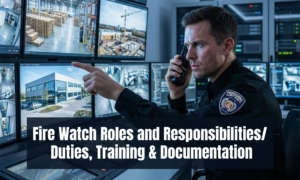The success of any event depends on achieving its purpose, which happens best when it proceeds smoothly without any disruptions. Effective crowd management is the right way to go about it.
Now you may be thinking, ‘why is crowd management important’ and ‘why do you really need it for any event?’
Your concerns are valid, and that’s why we are here to resolve them.
Let’s discuss the importance of crowd management, crowd management problems, and crowd management vs crowd control in detail today.
What is itCrowd Management?
Before moving on to why crowd management is important, we will brush on the basics first.
It basically refers to managing large groups of people gathered at any event. It encompasses planning the complete security of the guests at an event to ensure they stay safe and that no chaos, mismanagement, riot or friction of anything stirs up.
Be it a conference, a seminar, a festival, a fun fair, a sporting event, a concert, an exhibition, a school function or any other event, it will obviously have guests and attendees. When those guests gather, especially in huge numbers, they are going to interact and possibly move around.
During that time, certain issues sometimes arise, including crushing into fixtures, falling and slipping, conflicts and fights, and the like. For instance, the crowd gets out of control during a concert and tries to reach the stage. Or perhaps if the audience becomes agitated by something the speaker on stage said, they might create a riot in the seminar.
It is crucial to control these issues, and ensure their timely prevention.
That’s where crowd management steps in, it is about ensuring that the crowds are well-managed and no sort of problem arises that leads to bigger and probably life-threatening issues.
People often have an ambiguity regarding Public management: whether or not it is the same as crowd control. When brushing the basics, it is essential to highlight that difference too.
Crowd Management Vs Crowd Control
Typically, crowd management and crowd control seem identical. The ultimate purpose is to ensure the crowd’s safety.
However, deep scratching shows that the two are, in fact, different.
Crowd management is about managing people in a manner that they stay- safe and keep others safe too. It revolves around getting people safely from one point to another. For instance, ushering people to move from the entrance of a concert to the main hall or ensuring people find the different workshop spots in a big venue comes under Public management.
Crowd control involves following protocols that control the crowd and encourage them to behave a certain way. For example, placing fences and barriers around the cricket ground helps keep the crowd within the sitting area and prevents them from entering the ground.
With the difference all cleared up, let’s steer toward the goal of crowd management.
Goal of Crowd Management
The main purpose of crowd management is to guarantee that nobody in the crowd gets hurt, or experiences any sort of dangerous situation.
When we say crowd, it includes all the attendees and guests, performers, participants, staff members, employees, ushers and even the event management team. Whenever there is crowd, you can expect unusual situations and behaviors to arise. People often act differently in crowds compared to how they’d behave when alone.
Naturally, when unexpected, erratic or drastic behaviors take place, they lead to drastic results. The goal of Public management is to ascertain those behaviors do not occur so the event takes place smoothly and everyone enjoys themselves.
Moreover, crowd management also ensures that everyone stays safe and secure if any undesirable occurrence happens.
Now that we have highlighted the concept, and its purpose, let us discuss the importance of crowd management.
Why is Crowd Management Important?
When you are advised to try out something, be it a strategy, approach, or mechanism, it is natural for you to wonder about its significance.
Similarly, if you are thinking of getting Spectator management for the smooth functioning of your events, you should know ‘why is crowd management important.’

Safety of Individuals in the Crowd
The primary objective of crowd management is to ensure everyone in the crowd and at that particular event stays safe and secure. With the individuals all safe and sound, the event’s quality improves.
Prevention of Accidents & Injuries
Any time there is some kind of conflict amongst people in a crowd, it is likely to turn into a heated argument. That, in turn, may result in chaotic situations such as fights and disputes.
Spectator management revolves around the prevention of any such occurrences and accidents. Moreover, its goal is also to ensure that people do not get injured in case of any unforeseen situation.
Maintenance of Order & Control
The success of any event depends on many factors, including the prevalence of order and control. Crowd management centers on establishing order and management during the event, so it starts, proceeds, and ends smoothly without any kind of disruption.
Better Risk Assessment
Good crowd management cannot happen without effective risk assessment. A Spectator management team carries out a risk analysis of a prospective event along with foolproof plans to minimize the possibility of those risks. This leads to trouble-free and excellent events that provide maximum value to the attendees and the organizers.
Enhanced Pre-entry Verification
Crowd management teams comprise trained personnel to verify the entrants to an event. Naturally, when verified individuals enter an event, the odds of mismanagement and chaos automatically reduce.
Smooth Event Progression
Any time there is a hint of any disturbance in an event, it slows down. The entire schedule gets disrupted; attendees become upset; speakers and presenters experience problems; and the overall event turns into mayhem.
With powerful Congregation control in place, all these issues are taken care of. Consequently, this leads to smooth event progression.
Increased Revenue
Mismanaged events leave a bad aftertaste amongst the attendees. When people are dissatisfied with a certain event, it is likely they won’t attend another event by the same organizer or company. This affects your revenue and profitability.
Moreover, the success of events such as fun fairs, concerts, exhibitions, and festivals depends on the high sales of the stall owners. This goes in jeopardy in case of any issue and mismanagement in the crowd.
Crowd management ensures that no dysfunctionality occurs. When the event goes well from start to finish, the attendees and crowds are pleased, consequently bringing in more bucks for the organizers.
We are pretty sure now you have a much clearer understanding of why crowd management is important.
Just to reinforce its significance, let us walk you through what happens when crowd management is inadequate for an event.
The Risks of Inadequate Crowd Management
Inadequate crowd management can result in many potential risks and dangers. When crowds go unmanaged and unsupervised, an event is exposed to many perils, including property damage, legal issues, stampedes, and the like.
Let us dissect those risks one by one.
Panic and Stampedes
Without sufficient crowd management, crowds are likely to panic when they are unable to understand directions, find their way around the venue, and safely enjoy the event. Consequently, this results in panic, and stampedes soon stir in case the crowds are huge in numbers.
Property Damage
Stampedes, conflicts, riots, fights, and mismanagement paves the way for property damage during an event. Crowds breaking music equipment and fixture in concerts, breaking bleachers, and destroying structures in fairs and seminars are apt examples of property damage due to improper crowd management.
Legal Liability
Premises liability law is a subdivision of ‘Tort Law’ that stipulates a property owner is legally liable in case someone experiences an injury on the owner’s premises. This basically means inadequate crowd management can result in crowd management problems that, in turn, present legal issues for the owner.
Obviously, you don’t want to experience all these risks, and you will take reasonable crowd management measures in your events.
To make that happen, there are certain factors to take into account.
Factors to Consider in Crowd Management
So we have established the importance of crowd management, and now we’ll talk about the different factors you need to pay attention to for foolproof crowd management.
Size and Demographics of the Crowd
A small crowd requires simpler and fewer crowd management measures and tools, whereas a large crowd demands more and different tools and approaches.
Similarly, the crowd’s demographics, including age and gender, also play a crucial role in defining the crowd management measures for the event.
When putting crowd management measures in place, analyze the size and demographics of the crowd, so you have a plan and team in place that best caters to them.
Potential Hazards and Emergency Exits
When it comes to crowd management, people often ask: why is it essential to have knowledge of crowd management and control techniques?
Well, that’s primarily because understanding crowd management and control techniques allow you to analyze the potential hazards associated with a particular event. Once you know the threats that may affect an event, you can create an effective contingency plan for it.
While preparing the plan, pay attention to the emergency exits of the venue so the crowd management team knows where to place the appropriate crowd management tools.
Effective crowd management demands a good crowd management plan.
Venue Layout and Design
The design and layout of a venue is another integral factor that affects the total crowd management plan and measures for it.
A hexagonal-shaped venue demands a different set of crowd management measures as compared to a rectangular venue. Venues with a vintage architectural design require slightly different crowd management equipment, whereas venues with a contemporary layout need a different approach.
Assess the entire layout, design and architecture of the venue wherein you are planning to have an event to adopt the suitable crowd management strategy and tools for it.
Available Resources and Personnel
Before finalizing the crowd management team for an event, take stock of the available resources and personnel so you can create and assign a competent team to manage the event properly. Alternatively you can hire an event security company to plan and manage the resources for you.
Make a crowd management plan when planning crowd management measures for an event, and assess the above factors to maximize the team’s effectiveness.
There are some more practices that call for excellent crowd management. Let’s discuss them next.
Best Practices for Effective Crowd Management (checklist)
The importance of crowd management is best evident through its effective execution. Proper and adequate crowd management is responsible for the success of an event.
But what constitutes effective crowd management?
Let us share with you some of the best practices for excellent crowd management so the next time you work on it, you know precisely the things to take care of.
Planning and Preparation
The successful execution and completion of any project depend on its planning and preparation. This holds true for crowd management as well. To have a seamless event, you need effectual crowd management and a plan.
What is a Crowd Management Plan & Why is this Important?
A crowd management plan details all the necessary measures that must be taken to manage and control the crowd in an event. Usually, it comprises the following details:
- Type of event
- Time and date of event
- The expected size of the crowd
- Demographics of the crowd
- Entry and exit points
- Areas requiring crowd control
- Areas requiring crowd management
- Crowd control equipment, tools, and fixtures
- Crowd management equipment, tools, and fixtures
- Number of personnel required in the crowd management team
- Training required by the crowd management team
- Measures to take in order to control and manage the crowd
- Potential hazards that may upset the event and cause an upheaval
- A contingency plan to manage the hazards and keep the crowd safe and sound
- Ways to communicate with the crowd management team
- Any outside resources or help that may be required
With all these details in place, it becomes easier to understand the crowd management needs of an event. This makes the plan quite an essential element of the entire crowd management process because it sets the direction for the event.
Without a plan, the team may not be fully aware of the right management measures to employ, the equipment required, and the potential hazards associated with the event. If things go south, the crowd management team will likely experience trouble in controlling the issues timely.
To prevent the onset of such undesirable situations, pay attention to proper planning and preparing for crowd management on an event.
Communication and Coordination
Effective and timely communication is a crucial factor for the success of any event, particularly when it comes to crowd management. Crowd management teams need to communicate with each other and the different personnel appointed at different venue check, entry, and exit points.
Here is a checklist of the communication and coordination tasks you need to take care of when practicing crowd management.
- Set up communication media such as crowd and capacity monitoring solutions
- Set up the communication points
- Appoint a team leader for every team that is responsible for collecting information and data and reporting it to the crowd management head
- Collect data, including analytics from staff wristbands, crowd wristbands, or any other tool that is being used
- Use GPS staff trackers to facilitate communication between teams and staff members.
- Decide on the meeting times before, during, and after an event
- Check all the CCTV cameras and other security devices installed in the event venue prior to the event
- Ensure the WAN is operating properly
- Make sure the control room has network, power, high-speed internet connection, and other basic control room amenities such as display screens, chairs, tables, etc.
In addition to following all these guidelines, prep all the crowd management teams and staff members prior to the event to ensure seamless communication.
Risk assessment and emergency response
Risk assessment involves analyzing the potential risks associated with an event. It helps the crowd management team prepare a foolproof plan as well as contingency measures to handle the threats and setbacks effectively as well as promptly.
How the team responds in an emergency affects the team’s performance and the event’s functionality. Crowd management teams need to act calmly and pragmatically in emergency times so they put their best foot forward, and ensure the event runs smoothly.
Here is a risk assessment and emergency response checklist to follow to keep things under control:
- Assess potential threats associated with an event
- Gauge the potential harm that threat can impose
- Analyze how many people can be affected by the threat
- Find ways to combat that potential danger
- List down the activities the teams would have to engage in, step-by-step, in order to manage the threat.
- Create an emergency plan and run it by the team
To ensure the team follows the guidelines and plans efficiently, have regular training and drill sessions.
Training and Drills
A well-trained team is a competent and strong team. This is especially true for crowd management.
While planning and prepping a team for crowd management, do take care of the following:
- Ensure that an adept event coordinator is planning the entire event. The event coordinator is not just in charge of the event and venue but also has the task of appointing the Principal Crowd Manager. The event coordinator must be skilled and certified to handle event management.
- The principal crowd manager must conduct building safety inspections and submit a pre-event inspection form to the state’s emergency management and safety department. It is crucial that the principal crowd manager you hire understands performing a thorough building safety inspection and observes all the necessary protocols to manage it optimally.
- When hiring the principal crowd manager, ensure he/ she is certified by the Emergency Management and Safety office.
- The principal crowd manager has to appoint and coordinate crowd managers. He/ she must also be proficient in English and the event’s prominent language. If the manager isn’t, he/ she must receive training.
- The crowd manager must know the venue’s primary and alternate egress routes and exit locations well.
- In addition, principal crowd managers and subordinate crowd managers should be adept in crisis management and handling emergencies, know how to manage the event’s venue’s occupancy load; and be skilled in conducting an organized evacuation in case of an emergency situation.
- Moreover, crowd managers should have complete knowledge of the activities planned for the event so he/ she can manage the crowd accordingly.
- All the teams appointed at the exit, entry, and emergency points must also be certified in crowd management.
- Before having an event, the principal crowd manager must conduct drills for the crowd manager and all the staff members.
The event’s success depends on adequate training of the crowd managers and staff members.
Why is Crowd Management Important for Event Success
Crowd management is paramount for the success of events, especially ones attracting huge crowds. Sporting events such as cricket, football, rugby, lacrosse, and other tournaments; musical events and concerts; food-based events and culinary competitions; speaking engagements such as motivational speaking ventures; and many e-commerce events fall in this category.
When crowds go mismanaged, they are likely to result in problematic situations. For instance, allowing more attendees to enter a venue that cannot accommodate that big of a crowd leads to crowds banging into each other, and also crashing against the venue’s structures and fixtures.
Another example of poor crowd management is when crowds break the barriers, trying to reach the stadium speakers, performers, or players. Such behavior causes unrest in the event and can harm the attendees and the speakers/ performers.
Similarly, ineffective crowd management in festivals may result in fights and conflicts amongst crowds over money, availability of items, and the likes that can disrupt the event.
Conclusion
Events are important to boost a state’s economy, help flourish the organizing company as well as create growth, networking and entertainment opportunities for people. Amongst many other factors, crowd management is one crucial element that contributes to an event’s success.
After an in-depth discussion on why is crowd management important, event-organizing companies need to pay attention to crowd management to make their events meaningful and smooth.






